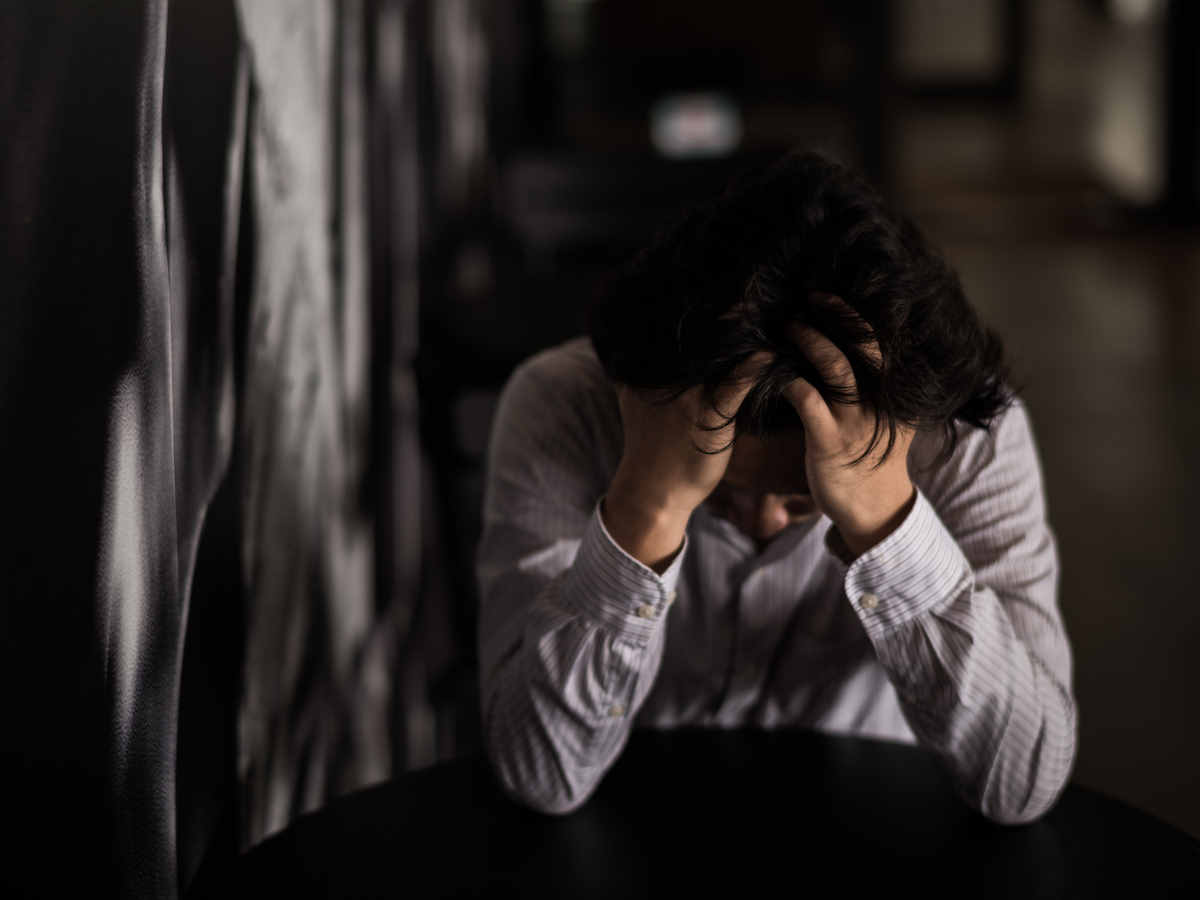Quick Summary
PTSD is a mental health condition affecting about 6% of the population that can develop after experiencing or witnessing a traumatic event, and in men it often presents as irritability, emotional numbness, or withdrawal rather than outward fear.
To be diagnosed, men must experience symptoms from four categories for at least one month: intrusion or re-experiencing, avoidance, changes in arousal and reactivity, and changes in cognition and mood.
When symptoms last longer than 30 days or worsen instead of improving, seeking professional support can help, and outpatient programs typically meeting three to five days per week for about three hours per day offer structured care while allowing men to maintain existing responsibilities.
Key Takeaways
- PTSD symptoms fall into four categories: intrusion or re-experiencing such as flashbacks and distressing memories, avoidance of reminders of the trauma, arousal and reactivity including irritability and sleep difficulties, and cognition and mood changes like negative thoughts and loss of interest in activities.
- Outpatient mental health programs typically meet three to five days per week for about three hours per day, providing structure and accountability while allowing men to remain present for work and family responsibilities.
- Untreated PTSD can lead to relationship strain, career difficulties such as trouble focusing or remembering details, and a higher risk of developing substance use disorders or depression.
- Seeking help when symptoms persist beyond 30 days or worsen over time is a sign of strength, and evidence-based therapies like cognitive behavioral therapy, dialectical behavior therapy, and EMDR can support recovery from trauma.
Post-traumatic stress disorder (PTSD) is a mental health condition that can develop after experiencing or witnessing a traumatic event. While it affects people of all genders and backgrounds, PTSD often presents differently in men. Instead of outward displays of fear or vulnerability, many men experience irritability, emotional numbness, or a tendency to withdraw. These symptoms can be subtle or misinterpreted, making PTSD harder to recognize and diagnose in men.
For many, the biggest challenge isn’t the trauma itself but learning to live with the aftermath. Countless men silently endure the symptoms of PTSD, burdened by societal expectations to “man up” or push through emotional pain. Pride, stigma, and a lack of awareness often prevent them from seeking help, even when their relationships, careers, and quality of life begin to suffer.
At Into the Light, we understand the unique struggles men face when coping with trauma and we’re here to help guide the way toward healing and hope. Shedding light on the common signs of PTSD in men helps make it clear when it is time to ask for help. Although it can be difficult, reaching out for support is the first step toward healing and overcoming the effects of PTSD.
What Is PTSD?
People experience a wide range of reactions to witnessing or experiencing a traumatic event. Traumatic events include experiences like acts of violence, serious accidents, childhood trauma, first responder work, military service, or natural disasters. Common responses include anxiety, fear, sadness, or anger; having difficulties sleeping or focusing; and distress from constantly thinking about what happened. Many people recover from these symptoms over time and their reactivity diminishes.
However, others may notice their symptoms persist after the event and start to affect daily life, including work or relationships. They continue feeling fearful, stressed, or reactive and cannot seem to manage their symptoms despite the time that passes. Some men may believe this is a weakness, but that is far from the truth. PTSD is a serious mental health condition. It affects about 6% of the population at some point during their lives.
Recognizing PTSD Symptoms in Men
Symptoms of post-traumatic stress disorder fall into four primary categories: intrusion (or re-experiencing), avoidance, changes in cognition and mood, and changes in arousal and reactivity. Men must experience at least one symptom from each category for at least one month to be diagnosed with PTSD.
Intrusion or Re-experiencing Symptoms
- Experiencing flashbacks, or intrusive, unwanted thoughts about or reliving the traumatic event, coupled with physical symptoms like sweating or racing heart
- Recurring memories or dreams connected to the event
- Distressing, unwanted thoughts
- Notable signs of stress
Thoughts and feelings can trigger intrusion or re-experiencing symptoms, as well as words, objects, or situations that remind someone of the traumatic event.
Avoidance Symptoms
- Avoiding places, events, objects, or people that remind someone of the traumatic experience
- Avoiding thoughts or feelings related to the event
Avoidance symptoms may cause people to change their routines, such as avoiding driving or going to certain places, which can cause significant disruption to daily life.
Arousal and Reactivity Symptoms
- Startling easily
- Feeling tense, on edge, or on guard
- Difficulties concentrating
- Difficulties falling asleep or staying asleep
- Feeling stressed or irritable
- Having angry or aggressive outbursts
- Engaging in risky, reckless, or harmful behavior
Arousal symptoms are usually constant and cause feelings of stress or anger that interfere with aspects of daily life, including concentrating, eating, or sleeping.
Cognition and Mood Symptoms
- Troubles remembering specific details about the traumatic event
- Having negative thoughts about oneself, others, or the world
- Exaggerated feelings of blame toward oneself or others
- Persistent negative emotions, such as fear, guilt, anger, or shame
- Loss of interest in hobbies or activities
- Isolating from friends, family, or other loved ones
- Difficulty experiencing positive emotions like satisfaction, happiness, or hope
Cognition and mood symptoms usually begin shortly after the traumatic event and worsen as time goes on. They often cause people to withdraw from their friends, family, and the world around them.
Why Men May Overlook PTSD Symptoms
Men often overlook symptoms of PTSD for the same reasons they overlook other mental health problems. Social conditioning and expectations encourage men to toughen up and keep their struggles to themselves. Men learn to suppress their emotions from the time they are young which causes them to bury the distressing symptoms following a traumatic experience.
They may chalk their discomfort up to stress, burnout, or “having a rough patch.” They don’t want others to think they’re weak for not being able to “handle their problems.” They may also not realize that their reactions are indicative of post-traumatic stress disorder. Hollywood portrayals of PTSD can exaggerate how symptoms present, causing men to diminish or minimize their reactions.
The Silent Struggle: How Untreated PTSD Impacts Men’s Lives
Ignoring or burying the symptoms of PTSD does not cause them to go away, it only causes them to come out in other areas. Men have some success with keeping their difficulties to themselves and might believe they are successful. However, if you ask those closest to these men, they can likely point out notable differences in their loved ones.
Untreated PTSD can have some serious impacts on the most important areas of a man’s life, particularly within his relationships with his spouse, children, family, and friends. Men who experience PTSD are often easily frustrated and reactive which can make them difficult to spend time around. No one wants to feel stressed or on edge all of the time, but being around someone with untreated PTSD can feel that way. This affects everyone closest to the man which affects him in return.
Symptoms of PTSD, particularly cognitive or avoidance symptoms, can cause career issues for a man. He may experience difficulties focusing, concentrating, or remembering important details. This lack of focus affects his work performance and can negatively impact his job or the jobs of those around him. Other men may handle their symptoms of PTSD with workaholism and pouring themselves into their job, pulling them away from other important aspects of their lives.
Men are also at a higher risk of developing substance use disorders as a side effect of PTSD. Drinking or using drugs covers up the negative emotions they don’t want to experience and can minimize symptoms. However, using substances to cope with symptoms only causes them to get worse over time. This can lead to growing mental health concerns, such as depression or even suicidal ideation. Struggling silently with PTSD is the worst thing a man can do; the sooner he seeks help, the better.
When to Seek Help: Recognizing the Turning Point
Continuing to experience distressing symptoms after experiencing a traumatic event is difficult to cope with. Most men bury their symptoms and keep their struggles to themselves. However, refusing to acknowledge the presence of symptoms does not make them go away; it only makes the problem worse with time. Learning to recognize the symptoms is a crucial first step toward making sure men receive the help and support they need.
Men must acknowledge and accept that their symptoms are the sign of something greater. They need to know that it’s more than just stress or a rough patch. When symptoms last longer than 30 days or they get worse instead of better, it is time to ask for help. Seeking support for symptoms of PTSD is not a sign of weakness, though. It is a sign of strength and willingness to do the work it takes to overcome the impact of trauma.
Outpatient Programs Can Help Men with PTSD
Inpatient mental health treatment is oftentimes not a viable solution for men with existing responsibilities like families to support and careers to uphold. Taking extended time away from these things is not always an option. Thankfully, outpatient programs are a widely available alternative. Outpatient mental health treatment programs are an excellent option for men experiencing post-traumatic stress disorder.
Outpatient programs typically take place three to five days per week for about three hours per day. They provide structure, support, and regular accountability while still allowing men to be present for their existing responsibilities. You do not have to uproot your entire life to receive high-quality mental healthcare; outpatient programs provide a balanced solution.
Some programs, such as those at Into the Light, provide treatment programs for men. Men’s mental health treatment is a critical component for many men who want help but feel weak when seeking it. Finding themselves in groups with other men who know exactly how they feel and struggle with similar troubles but are willing to seek help is the perfect environment. Men can let their guard down and genuinely connect with peers who understand what they are going through.
Into the Light offers a range of evidence-based approaches to mental health treatment for PTSD, including cognitive behavioral therapy, dialectical behavior therapy, and eye motion desensitization and reprocessing therapy (EMDR). We also provide holistic approaches to care to supplement the treatment process. Our outpatient mental health treatment program in Redlands, CA is an excellent option for men in the surrounding areas, including San Bernardino, Mentone, Loma Linda, Yucaipa, Colton, and more.
If you are struggling with the symptoms of PTSD, you don’t need to handle them alone anymore. Our compassionate, caring team is here to help you every step of the way, from the moment you first reach out until well after you finish your program. Seeking help for PTSD can feel intimidating, but it is the first step toward a life free from symptoms. Call us at (877) 446-8685 or submit an online contact form today. Our admissions specialists will be in touch with you to help you begin your path to healing. All it takes is the willingness to reach out; we will be right here for you.


